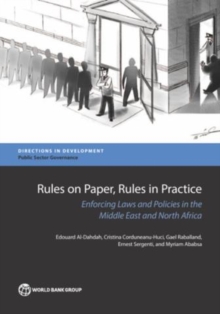
Paths between peace and public service : a comparative analysis of public service reform trajectories in postconflict countries Paperback / softback
by Jergen Rena Blum, World Bank, Marcos Ferreiro-Rodraguez
Part of the Directions in development series
Paperback / softback
Description
Building a capable public service is fundamental to postconflict state building.
Yet in postconflict settings, short-term pressures often conflict with this longer-term objective.
To ensure peace and stabilize fragile coalitions, the imperative for political elites to hand out public jobs and better pay to constituents dominates merit.
Donor-financed projects that rely on technical assistants and parallel structures, rather than on government systems, are often the primary vehicle for meeting pressing service delivery needs.
What, then, is a workable approach to rebuilding public services postconflict? Paths between Peace and Public Service seeks to answer this question by comparing public service reform trajectories in five countries - Afghanistan, Liberia, Sierra Leone, South Sudan, and Timor-Leste - in the aftermath of conflict.
The study seeks to explain these countries' different trajectories through process tracing and structured, focused methods of comparative analysis.
To reconstruct reform trajectories, the report draws on more than 200 interviews conducted with government officials and other stakeholders, as well as administrative data.
The study analyzes how reform trajectories are influenced by elite bargains and highlights their path dependency, shaped by preconflict legacies and the specifics of the conflict period.
As the first systematic study on postconflict public service reforms, it identifies lessons for the future engagement of development partners in building public services.
Information
-
Item not Available
- Format:Paperback / softback
- Pages:438 pages, col. figs, tables
- Publisher:World Bank Publications
- Publication Date:28/01/2019
- Category:
- ISBN:9781464810824
Information
-
Item not Available
- Format:Paperback / softback
- Pages:438 pages, col. figs, tables
- Publisher:World Bank Publications
- Publication Date:28/01/2019
- Category:
- ISBN:9781464810824










